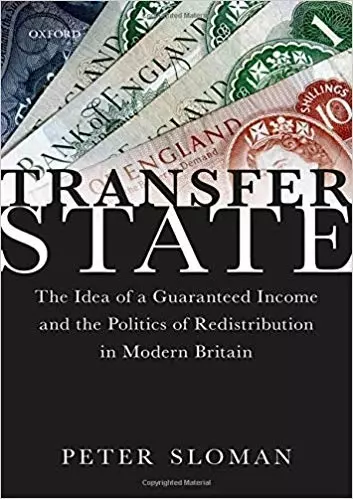Transfer State
Peter Sloman
Key lessons for basic income advocacy
Peter Sloman has produced a fascinating, comprehensive, detailed, forensic economic history of UK welfare philosophy, politics and practice, which he interprets and evaluates against the criterion of fit to the concept of universal basic income (UBI). This yields useful philosophical and political guidance on the potential for adoption of UBI.
Sloman charts a fundamental clash between i) full male employment wage and ii) transfer payments, to sustain individual and family economic well-being, and to eradicate poverty, particularly child poverty. After a review of negative income tax experiments, in his crucial chapter 7, Sloman shows how Gordon Brown’s 1997-2010 tax credits shifted Labour thinking to accept market determined wage, compensated by extensive transfer payments, in an increasingly integrated tax and welfare system. The shift is consistent with the long-term trend whereby social security spending has risen from 4% to 12% of GDP in the post war period, even rising from 8% to 11% during the Thatcher regime. It implements the economic philosophy of ‘RML’, ‘redistributive market liberalism’ proposed by John Kay et al. Sloman shows how computerisation allowed this shift practically.
However, the calamitous ineptitude of their implementation discredited tax credits, and led to a resurgence of employment and national living wage campaigns as the philosophy undergirding Iain Duncan Smith’s Universal Credit with its strict employment-led conditionality. Meanwhile, Ed Miliband, IPPR and others led Labour back to employment and wage solutions to poverty and dignity, in a policy of ‘predistribution’. Sloman correctly critiques this philosophy by pointing out that technology might not enable full employment wage solutions (p223).
Chapter 9 covers the recent history of the UBI movement. Sloman hails the Citizen Basic Income Trust’s model developed by Malcolm Torry as ‘perhaps the most realistic path for introducing a basic income in the UK’ (p244). But this scheme has a cost of £164bn, funded by elimination of personal tax allowances (£72bn), a 3% increase in tax rates (£12bn), harmonising NI thresholds (£45bn), and reducing current means-tested benefits (£33bn). The scheme fails to counter austerity, and has a mild effect in terms of winners and losers, so is not redistributive. Its main benefit is the avoidance of means-testing and the elimination of administrative cost, although this is not quantified. It’s hardly a winning proposition.
Sloman does not address the macroeconomic case for UBI or the macroeconomic means for its funding. As he mentions, automation does reduce the wage content of output, such that earned income becomes insufficient to fund macroeconomic demand, which then relies on unearned income, and, more dangerously, household borrowing. Burgeoning consumer debt leads to crisis, and the government deficit constraint leads to austerity. The solution which Sloman doesn’t address is for UBI to displace household borrowing which has run at huge annual rates of £80-160bn, and for sovereign state money to displace deficit in national accounts. UBI funded by sovereign money is a credible, even a necessary, proposal.
From the example of universal credit, Sloman does show that any policy proposal crucially needs strong public campaigning, matched by internal government patronage and technological capability to succeed (p212). He also points out that the impact of any such policy ‘is crucially dependent on policy details’ (p215). UBI advocates need to heed this advice.
Geoff Crocker
Editor ‘The Case for Universal Basic Income’
www.ubi.org

